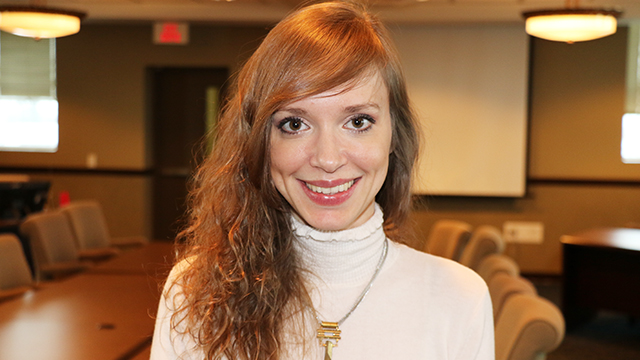
The latest of Research and Creation Conversations, a project put forward by the Research Office of Campus Saint-Jean, was held on 11 December, 2015. This time it was Valérie Lapointe Gagnon, Assistant Professor in History and Linguistic Rights, who presented the Laurendeau-Dunton Commission, her doctoral and postdoctoral research interests.
The latest of Research and Creation Conversations, a project put forward by the Research Office of Campus Saint-Jean, was held on 11 December, 2015. This time it was Valérie Lapointe Gagnon, Assistant Professor in History and Linguistic Rights, who presented the Laurendeau-Dunton Commission, her doctoral and postdoctoral research interests.
"The Laurendeau-Dunton Commission represents a particular moment in Canadian and Quebec history. Happening in a rather unusual context in the early 1960s, the commission brought together committed intellectuals to brainstorm and seek solutions to the linguistic differences plaguing the country, "says Mrs. Lapointe Gagnon.
This committee brought together 10 Commissioners and a research team composed of more than one hundred Canadian and foreign universities. During these sessions, 400 reports were written. A final six volume report was published: I. The Official Languages, II) Education, III) Work World, IV) Cultural Contribution of other Ethnic Groups, V) Federal Capital, VI) Voluntary Associations."This is one of the most influential inquiry commissions dealing with linguistic policies in the country," says the Assistant Professor.
In her presentation, Valérie Lapointe Gagnon first explained the background of this commission. She recalled that in the 60s, there was a growing Canadian identity crises. Canadians were torn between their British roots and the need to find new symbols. "It should also be pointed out that Quebecers also wanted to affirm their own identity alongside with the harsh criticism of the lack of bilingualism in Ottawa, not to mention the proliferation of studies on this duality in intellectual and academic circles."
The inquiry project on Bilingualism and Biculturalism was initiated by Lester B. Pearson in July 1963. It brought together a team of 10 commissioners who would represent Canadian diversity. There were two co-directors André Laurendeau (Montreal) and Davidson Dunton (Montreal) and 8 commissioners: Father Clément Cormier (Moncton), Royce Frith (Toronto), Jean-Louis Gagnon (Montreal), Jean Marchand (Montreal) Gertrude Laing (Calgary), Jaroslav Rudnyckyj (Winnipeg), F.R. Scott (Montreal) and Paul Wyczynski (Ottawa).
Valérie Lapointe Gagnon noted that the mandate of this commission was quite clear: "To investigate and report on the current state of bilingualism and biculturalism in Canada and to recommend measures that would enable the Canadian Confederation to develop according to the principle of equality between the two peoples who founded it, considering the contribution of other ethnic groups to the cultural enrichment of Canada, as well as recommending measures to protect their contributions."
With her research, the Assistant Professor wants to unveil the other facet of a key moment in Canadian intellectual history by breaking the boundaries between the Anglophone and Francophone intellectuals communities, by integrating women and by highlighting the contribution of commissioners that were less known like Gertrude Laing, Paul Lacoste and Jaroslav Rudnyckyj.
Valérie Lapointe Gagnon uses this research conversation platform to present the plurality of solutions envisaged at the time. "The political scientist, Guy Laforest, emphasizes the special moment that 1968 was because constitutional changes were possible. All options had been explored by the Commission. Some commissioners were in favour of a complete review of the initial compromise. Commissioners wanted to ensure that this would not be an obstacle for anyone to speak French anywhere in the country. They will want to put in place measures to lessen the disparities," she noted.
Some of the suggested changes included:
- To revise Article 133 of the Constitution (English and French are the two official languages of Canada)
- To encourage immersion programs
- To create Research Chairs on Bilingualism and biculturalism in universities
- To ensure that French is the official work language of Quebec
- To create a place of reflection on how to rethink the Confederation to give a special place to Quebec.
The contribution of Gertrude Laing
According to Valérie Lapointe Gagnon, there is no doubt that the Commissioner Gertrude Laing, of Calgary, contributed positively to the commission.
"She had an original idea of linguistic rights and the place of French in Canada. She gave lectures to the ACFA in the 1960s on the position that French should have this country. She was even in favour of a major constitutional revision, "says the Assistant Professor of Gertrude Laing who was born in 1905 in England, who immigrated to Canada five years before moving to Calgary in 1952.
She hopes in the coming months to focus on the five intellectual women in search of freedom and equality, that is Gertrude Laing, Hilda Neatby, Solange Chaput-Rolland, Jeanne Lapointe and Gwethalyn Graham.
It is possible to consult Valérie Lapointe Gagnon thesis on the Laurendeau-Dunton Commission at the following address: http://theses.ulaval.ca/archimede/meta/30466